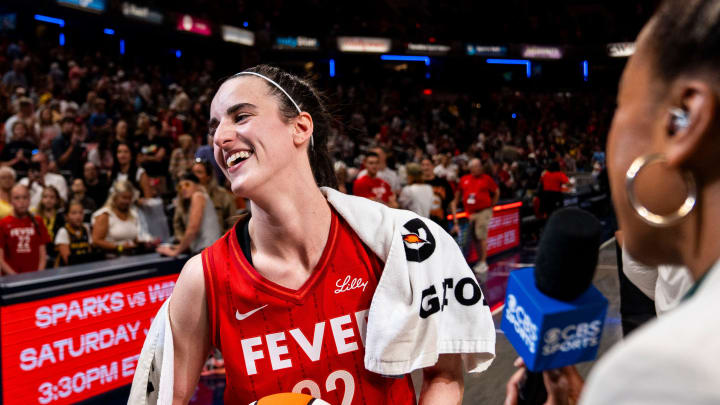Caitlin Clark Is Very Popular, Not Very Divisive, per Study

The Caitlin Clark takes have cooled off in recent weeks as she's gone about the business of acclimating to the WNBA and getting the Indiana Fever in position to compete for a playoff spot. But for a while there, they were flying fast and furious and oftentimes had to include Chicago Sky rookie Angel Reese as a Magic Johnson-Larry Bird type rivalry was being soft-launched. Along the way Clark earned the label of being controversial or polarizing even as she did everything she could to not take the bait or add much fuel to the fire.
So where do we stand 24 games into her rookie season, as she's risen to be one of the biggest storylines in all of sports? A new study from National Research Group canvassing over 1,000 self-described sports fans suggest that Clark is not, in fact, polarizing at all. Her numbers, crunched and translated by the Sports Business Journal, suggest she's bordering on being universally liked. And that the media's coverage of Clark has made her an even more sympathetic figure.
- 66% have an overall positive impression of Clark (just 4% negative). That is better than NBA players such as Kyrie Irving, LeBron James, Jayson Tatum and Kevin Durant (she’s tied with Nikola Jokic, and just below Steph Curry and Luka Doncic).
- 72% who follow Clark say that they sympathize with her because of the press attention she’s received (60% say the media treats her unfairly). Another 41% have seen coverage of Clark’s rivalry with Reese, or stories about jealousy toward her from other WNBA players.
This is merely one study. And there will be so many more to come in Clark's career. Yet it does feel a bit instructive that Clark is enjoying overwhelmingly positive attention. Because there are a significant amount of people operating in bad faith trying to convince the public that she's reviled or the mainstream media is either too hard too soft on her.
All that's happening, through all the noise, is a very popular player growing more popular with more exposure. It's what we've suspected has been going on but there's finally some hard data to back that feeling up.
